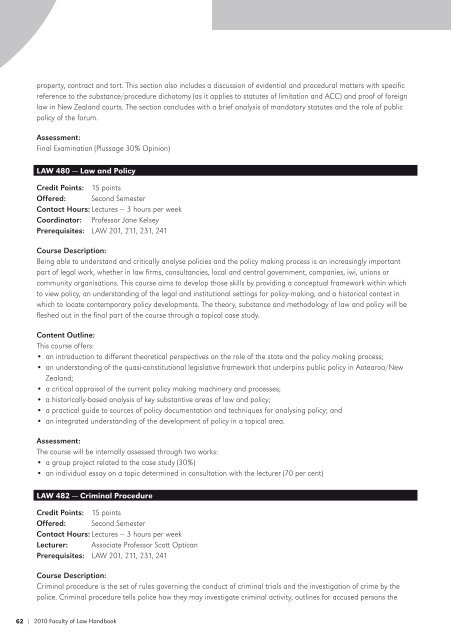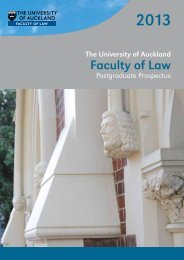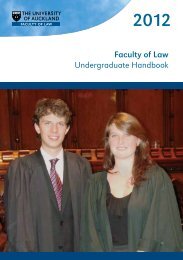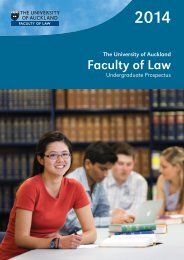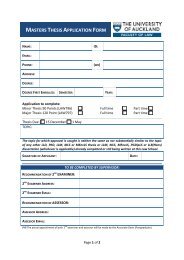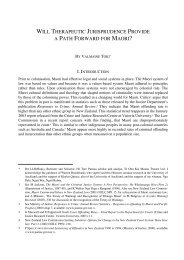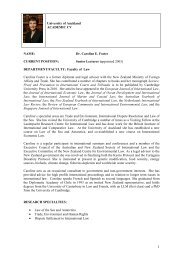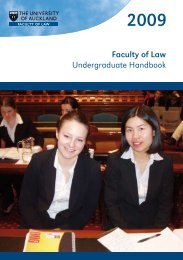Faculty of Law Undergraduate Handbook - Faculty of Law - The ...
Faculty of Law Undergraduate Handbook - Faculty of Law - The ...
Faculty of Law Undergraduate Handbook - Faculty of Law - The ...
- No tags were found...
You also want an ePaper? Increase the reach of your titles
YUMPU automatically turns print PDFs into web optimized ePapers that Google loves.
property, contract and tort. This section also includes a discussion <strong>of</strong> evidential and procedural matters with specificreference to the substance/procedure dichotomy (as it applies to statutes <strong>of</strong> limitation and ACC) and pro<strong>of</strong> <strong>of</strong> foreignlaw in New Zealand courts. <strong>The</strong> section concludes with a brief analysis <strong>of</strong> mandatory statutes and the role <strong>of</strong> publicpolicy <strong>of</strong> the forum.Assessment:Final Examination (Plussage 30% Opinion)LAW 480 — <strong>Law</strong> and PolicyCredit Points: 15 pointsOffered: Second SemesterContact Hours: Lectures — 3 hours per weekCoordinator: Pr<strong>of</strong>essor Jane KelseyPrerequisites: LAW 201, 211, 231, 241Course Description:Being able to understand and critically analyse policies and the policy making process is an increasingly importantpart <strong>of</strong> legal work, whether in law firms, consultancies, local and central government, companies, iwi, unions orcommunity organisations. This course aims to develop those skills by providing a conceptual framework within whichto view policy, an understanding <strong>of</strong> the legal and institutional settings for policy-making, and a historical context inwhich to locate contemporary policy developments. <strong>The</strong> theory, substance and methodology <strong>of</strong> law and policy will befleshed out in the final part <strong>of</strong> the course through a topical case study.Content Outline:This course <strong>of</strong>fers:• an introduction to different theoretical perspectives on the role <strong>of</strong> the state and the policy making process;• an understanding <strong>of</strong> the quasi-constitutional legislative framework that underpins public policy in Aotearoa/NewZealand;• a critical appraisal <strong>of</strong> the current policy making machinery and processes;• a historically-based analysis <strong>of</strong> key substantive areas <strong>of</strong> law and policy;• a practical guide to sources <strong>of</strong> policy documentation and techniques for analysing policy; and• an integrated understanding <strong>of</strong> the development <strong>of</strong> policy in a topical area.Assessment:<strong>The</strong> course will be internally assessed through two works:• a group project related to the case study (30%)• an individual essay on a topic determined in consultation with the lecturer (70 per cent)LAW 482 — Criminal ProcedureCredit Points: 15 pointsOffered: Second SemesterContact Hours: Lectures — 3 hours per weekLecturer: Associate Pr<strong>of</strong>essor Scott OpticanPrerequisites: LAW 201, 211, 231, 241Course Description:Criminal procedure is the set <strong>of</strong> rules governing the conduct <strong>of</strong> criminal trials and the investigation <strong>of</strong> crime by thepolice. Criminal procedure tells police how they may investigate criminal activity, outlines for accused persons the62 | 2010 <strong>Faculty</strong> <strong>of</strong> <strong>Law</strong> <strong>Handbook</strong>


